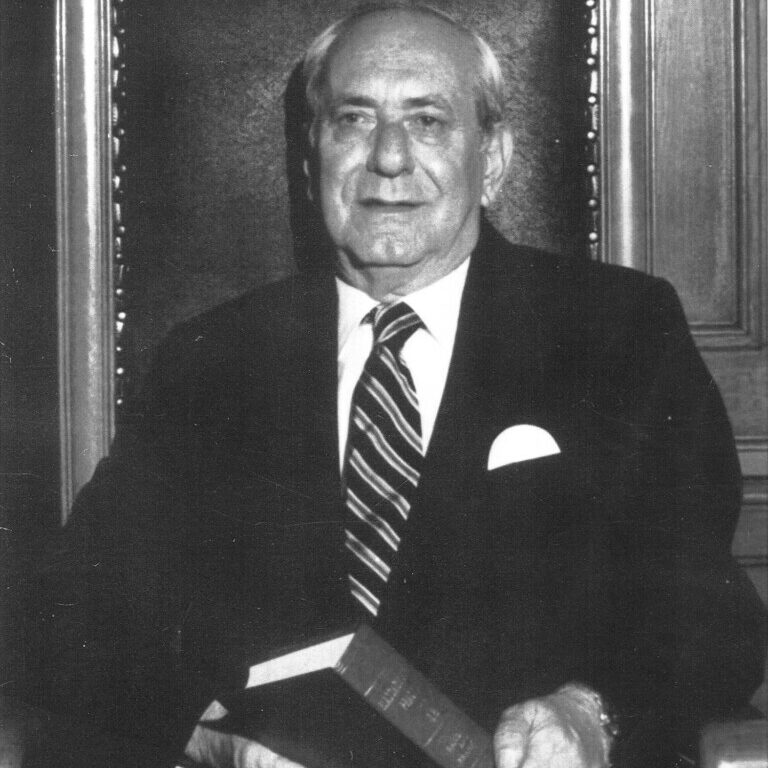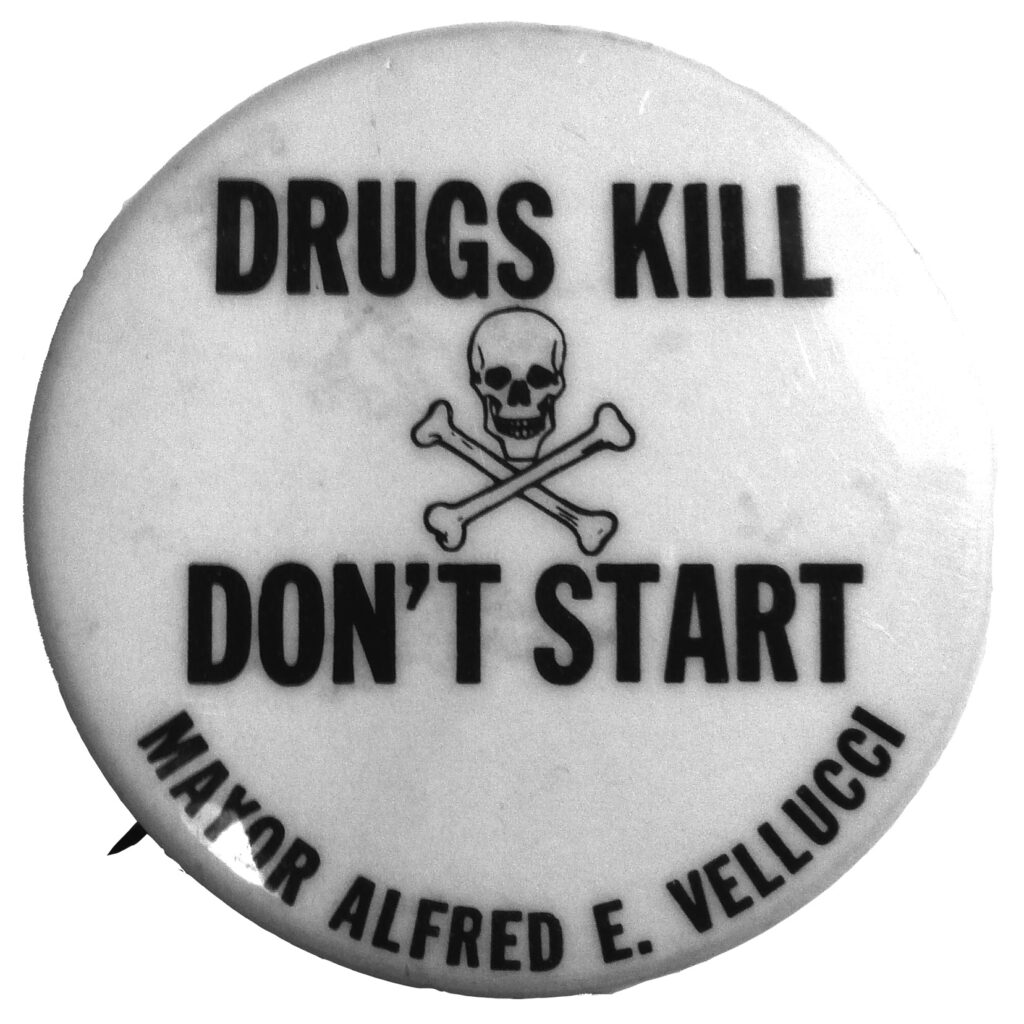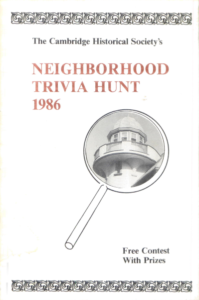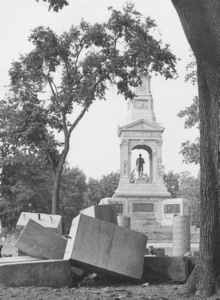
Al Vellucci
By Gavin W. Kleespies, 2013
The name Al Vellucci meant different things to different people in Cambridge. But the name meant something to everyone. Vellucci was a political juggernaut, he knew everyone and was at every event. In the 1994 New York Times obituary for Tip O’Neill, Vellucci was quoted as saying “There were only three politicians – James Michael Curley, Tip O’Neill and Al Vellucci.” and he was probably right.
Born in 1915 in Somerville, he soon moved to East Cambridge. His daughter Mary Ann Almeida commented “He was self-made. He didn’t have a college education; in fact I think it was in the 6th grade that he quit school. He supported… his family, because his father died. He supported his mother and his family at 14 years old and owned a trucking business. That’s how amazing he was.”
At the age of 21 he won his first election, to be a representative to the State Democratic Convention. In 1952, he was elected to the School Committee and then in 1955 ran for the City Council and won, kicking off an almost 35 year career in Cambridge politics.
Although he was a humble man in many ways, he loved to be in the center of whatever was going on and he did whatever it took to stay there. Sometimes he got there through his incredible drive or his dedication to causes he held dear, sometimes it was because he was the person who could bring desperate groups together, sometimes it was through being outrageous, but he always got to the center of the action.
His daughter Mary recounted “He was a 24/7 councilor. He was always dressed in a suit and tie, I never saw my father in anything else. Even if you were at a picnic, he was in a suit and tie… He could do carpentry, believe it or not, and if he was hammering something around the house fixing it… he would be hammering in a suit and tie.” Sandra Albano, his former assistant, remembered “He would get up at like 5:00 in the morning and he would go have coffee with the people from DPW, because… he wanted to know all of them.” Louis Depasquale, head of the City of Cambridge Finance Department commented “He’d get his cup of coffee and he’d really be out in the streets and in the neighborhoods from 5:00 to about 2:00.Then he would take a nap every day from about 2:00 to 6:00 and then he’d be ready to roll. He’d keep on going until he fell asleep at night and then he’d be back on the streets.” The midday nap may have been a key to his success. Sandy Albano said “When I worked for him when he was the mayor, he would always leave at around 1:00 or 1:30 and he would nap… He would come back at 4:00, 4:30 full of vinegar, rearing to go. And we were all rearing to go with him. That’s the kind of man he was.”
One of the causes he cared about was making sure kids in East Cambridge had something good to do, so he helped found a drum corps, the Don Juans. Sandy Albano grew up playing in this group and remembered “The part that sticks in my mind is, when we would compete, we were pretty good so we won… we wouldn’t get back to Cambridge until about 11 or 11:30 and he would park the car at Lechmere and we would get off the bus and we would march from Lechmere back to Warren and Porter Street playing the music at midnight. I don’t know if we could do that today, but we did it. And he would be there leading us through.” “He was a very loyal supporter also of the Cambridge Hospital.” Louis Depasquale commented. “Back then it was not the way it stands now as the Health Alliance, but that was very important to him. To make sure that people of the city could receive care. Especially the poorer people, that they could go to a place and receive care. That was something that meant a lot to him.”
He was famous for bringing together people from all walks of life in Cambridge. “When you would go to one of those meetings you would have the President of Harvard, a City Councilor, someone who was working, cooking the food, someone who lived in East Cambridge, maybe a teacher, but it was just the way he could cross all different types of people together and just have them trying to work together to solve a problem.” Depasquale remembered. “He felt that anything could be resolved over the dinner table. That’s where he had his biggest meetings; either in his back yard, where it would be spaghetti with garlic and oil, or in his son, Peter Vellucci’s (former State Rep) office on Cambridge Street. He would host events… and they would discuss how they could come together on things that effected East Cambridge, effected the city of Cambridge.”
While he was famous in East Cambridge, he was more notorious within the halls of Harvard. The 1965 Yearbook of Harvard and Radcliff carried an article titled “Tickertape Ain’t Spaghetti” which said “Vellucci undoubtedly has made more Crimson headlines than any subject save drugs and sex. He has spoken at the Law School, addressed House forums, and lunched with professors at the Signet Society table. He has surpassed most national political figures in fame on the Harvard campus…” However, this description did not fully convey why Vellucci so often made the Crimson headlines. He may have been eating pasta with the college president, but he also skewered the university with great relish.
He famously proposed using Harvard Yard as a parking lot, but that was just the tip of the iceberg. In 1962 he proposed naming the intersection in front of the Harvard Lampoon building “Yale Square.” The following year he recommended seizing the Lampoon by eminent domain and turning it into a public urinal. He described the Lampoon castle as a “mouth house” and was quoted in the Crimson saying “It is the ugliest building I ever did see. It is the ideal spot for a public restroom.” In 1963 Peter Kann reported on Vellucci’s reaction to the proposed construction of a new Harvard Education School building on Appian Way: “I have information that the castle may really be a prison,’’ Vellucci stated. He pointed to the moat which will surround the seven-story, window-scarce monolith, as evidence of secret designs by the Education School. ‘‘They may have crocodiles swimming around in there,’’ Vellucci declared.
In 1964 he recommended seizing and razing part of Harvard Yard, which would have included the president’s office in Massachusetts Hall, by eminent domain to improve traffic patterns. When asked how he could declare the buildings blighted, he replied “they’re all 300 years old.” He traveled to New Haven for the Harvard-Yale game and cheered for Yale; even going so far as to give the Yale team a pep talk one year. In 1968 George Hall reported on Vellucci asking the City Council to change the name of Harvard Square to Christopher Columbus Square, saying “That guy Harvard never did anything for Cambridge except give the city six lousy books on Protestant theology – and THAT place.”
Vellucci took glee in dishing out abuse towards Harvard and he was a maverick in the city government. Depasquale said “Obviously he was a very, very strong supporter of rent control. Which was a different stance because the way the Council was set up back then, there was an independent council that was anti-rent control and the CCA was pro-rent control, and Al was the independent who was pro-rent control. So he walked a very tricky line when it came to that… He was the swing vote. He enjoyed the attention. He knew how to catch people’s attention.”
Sandy Albano remembered “when I first came to work for him… I think it was the teachers unions were negotiating with the school committee and we were here a whole weekend…. And at the time the Averof restaurant was still around, and he had a belly dancer come in to lighten up some of the negotiations and we had food served. He kept us captive until… it was settled. It was a long time ago, but I do remember, I looked at him and I said “you want what?” and he said “get the Averof on the phone, I want food and I want a belly dancer.” And he had a belly dancer here. I mean that was him.”
However, even with all of this political theater, he remained deeply tied to the working class community that elected him. His daughter remembered “My father was a very humble man. We lived in a very simple house. He drove Chevys. He would get one Chevy, wear it to the ground driving it and then go get the same thing; the same Chevy, the same color, just a model that was a few years later. He was a pretty humble man, he didn’t believe in extravagance… If we did anything that was extravagant, like if we ordered Chinese food or something, we would get accused of living like rich Romans. He would call us rich Romans. If you were in bed at 7:00 in the morning he would say “you people are living like rich Romans, you should have been up.””
He was also always looking out for the little guy and standing up for his neighborhood. “Al really loved East Cambridge; he really supported the people of East Cambridge. He wanted to help, especially the people who needed the help the most, I think that was the thing.” remembered Depasquale. In his time, he was the best known resident of East Cambridge and he definitely was one of the most colorful politicians in Cambridge History.



